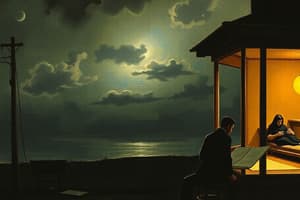Podcast
Questions and Answers
Who was one of the key figures claiming the throne after Edward the Confessor's death?
Who was one of the key figures claiming the throne after Edward the Confessor's death?
- Tostig Godwinson
- Edith Godwin
- William of Normandy (correct)
- Harold Hardrada (correct)
What might have influenced Edward the Confessor's decision not to have children with Edith Godwin?
What might have influenced Edward the Confessor's decision not to have children with Edith Godwin?
- His financial situation
- His approval of marriage customs
- His commitment to a vow of celibacy (correct)
- His desire to maintain political alliances
What is a possible reason for Edward the Confessor's aversion to having children?
What is a possible reason for Edward the Confessor's aversion to having children?
- Hatred of his father-in-law (correct)
- Influence from the Church
- Desire for a peaceful reign
- A fear of losing power
What does the term 'celibacy' refer to in the context of Edward the Confessor?
What does the term 'celibacy' refer to in the context of Edward the Confessor?
What situation does the phrase 'refused permission to return' refer to?
What situation does the phrase 'refused permission to return' refer to?
Flashcards
Exile
Exile
The refusal to allow someone to return to their home country.
Claimants to the English Throne
Claimants to the English Throne
Three men who claimed the throne of England after Edward the Confessor died.
Celibacy
Celibacy
A vow to abstain from sexual relations.
Succession
Succession
Signup and view all the flashcards
Hatred
Hatred
Signup and view all the flashcards
Study Notes
Edward the Confessor's Death and Succession Claims
- Four men claimed the English throne after Edward the Confessor's death in 1066.
- Three of these claimants were willing to fight for the crown.
- Harold Godwinson was one of the claimants.
Harold Godwinson's Claim
- Harold Godwinson's succession was part of the process.
- The issue of succession prompted conflict.
Edward the Confessor's Possible Religious Life
- Edward the Confessor was possibly a devout man, potentially taking a vow of celibacy.
- Some historical accounts, especially from Norman sources, highlight his religious devotion.
- Modern historians suggest Edward may have refused to have children with Edith Godwin due to a conflict with his father-in-law.
Studying That Suits You
Use AI to generate personalized quizzes and flashcards to suit your learning preferences.




